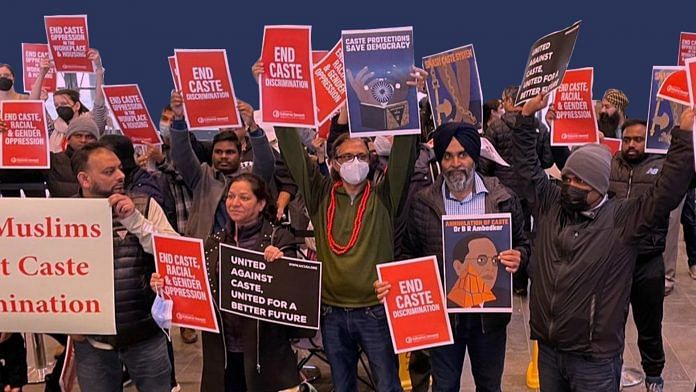During his recent trip to the US, Rahul Gandhi spoke about the “miserable condition” of Dalits in India. In the US too, the community of lowered castes have faced discrimination. In 2021, a prominent Hindu temple in New Jersey was raided by the FBI. BAPS, the Hindu sect operating the temple, faced federal charges for luring hundreds of lowered-caste workers from India and exploiting them to work under hazardous conditions to construct the temple for little pay.
Delivering his famous speech in 1936 at the Bombay Presidency Mahar Conference, BR Ambedkar highlighted the significance of legislation in transforming equality, which otherwise “may be a fiction”, into governing principles. That is exactly what the United States’ anti-discrimination legislation tries to embody.
However, the problem arises when the legislation ends up discriminating based on who receives equal treatment and who does not, which essentially takes us back to square one — the “legislators” as perpetrators of such discrimination. That is exactly what happened with American anti-discrimination laws when a case was brought against Cisco Systems by California’s employment regulators. The tech company’s two engineers were accused of discriminating against a Dalit employee, but the case was unsurprisingly dismissed, highlighting the non-inclusive nature of anti-discrimination laws in the US.
The exploitation by BAPS or the case against Cisco engineers is not a 21st-century phenomenon. Numerous such instances of explicit caste discrimination in the US date as far back as 1910 and such discriminations are still not truly protected in the country. The “Doe v. Cisco System Inc.” is accompanied by a series of recent cases like “John Doe v. Princeton University” and “Chandana v. Carnegie Mellon University”, which have highlighted not just individual but an institutionalised form of discrimination of people who are left outside the brackets of “protected class”. In all these cases, the authorities reportedly did not act against explicit discrimination because of a lack of inclusivity in the anti-discrimination laws.
Hence, in a historical move, California’s State Senate passed a bill last month with a 34-1 vote to add ‘caste’ as a protected category under the American anti-discrimination laws. The bill, which has been long overdue, sends a loud message for inclusive anti-discrimination laws and equality for all.
Also read: Seattle, California caste ban votes same as BJP’s Project Pasmanda. For US ‘model minority’
Shared struggle for equality
The passage of this legislation comes at a time when the civil rights of marginalised communities continue to be a pressing global issue. Around the world, people from different backgrounds are fighting against their exclusion from anti-discrimination and oppression laws. Countries such as the United Kingdom, Australia, and India have witnessed transformative changes through the reform of equality legislation. India’s Scheduled Castes and Scheduled Tribes (Prevention of Atrocities) Act and the UK’s Criminal Justice and Immigration Act have shown the power of an inclusive approach in strengthening the fight for equality.
Moreover, the UK has time and again accentuated the need for inclusive amendments to its laws through cases such as “Tirkey v Chandhok” on caste discrimination and “Mandla v Dowell-Lee” on equality legislation. It is remarkable that the US is now leading this movement for equality abroad. In addition to California’s senate passing the Senate Bill (SB) 403 with a near-majority, the Seattle City Council has also passed an ordinance banning caste discrimination.
As we move forward, it is essential that we recognise the importance of equality for all towards creating a more equitable society, not only for social but also economic and judicial well-being. Seattle and California have marked a significant milestone that serves as a reminder of the continued struggle for equality, not just for caste-based discrimination but also the fight against gender, sex, race, linguistics, and all other forms that plague our society. It truly is an inspiration and a role model for others to follow.
The author is the president of Foundation for Human Horizon, an UN-affiliated NGO that’s
leading the Anti-Caste legislation movement in the USA and an Artificial Intelligence (AI)
Research Scholar at John Hopkins University.



